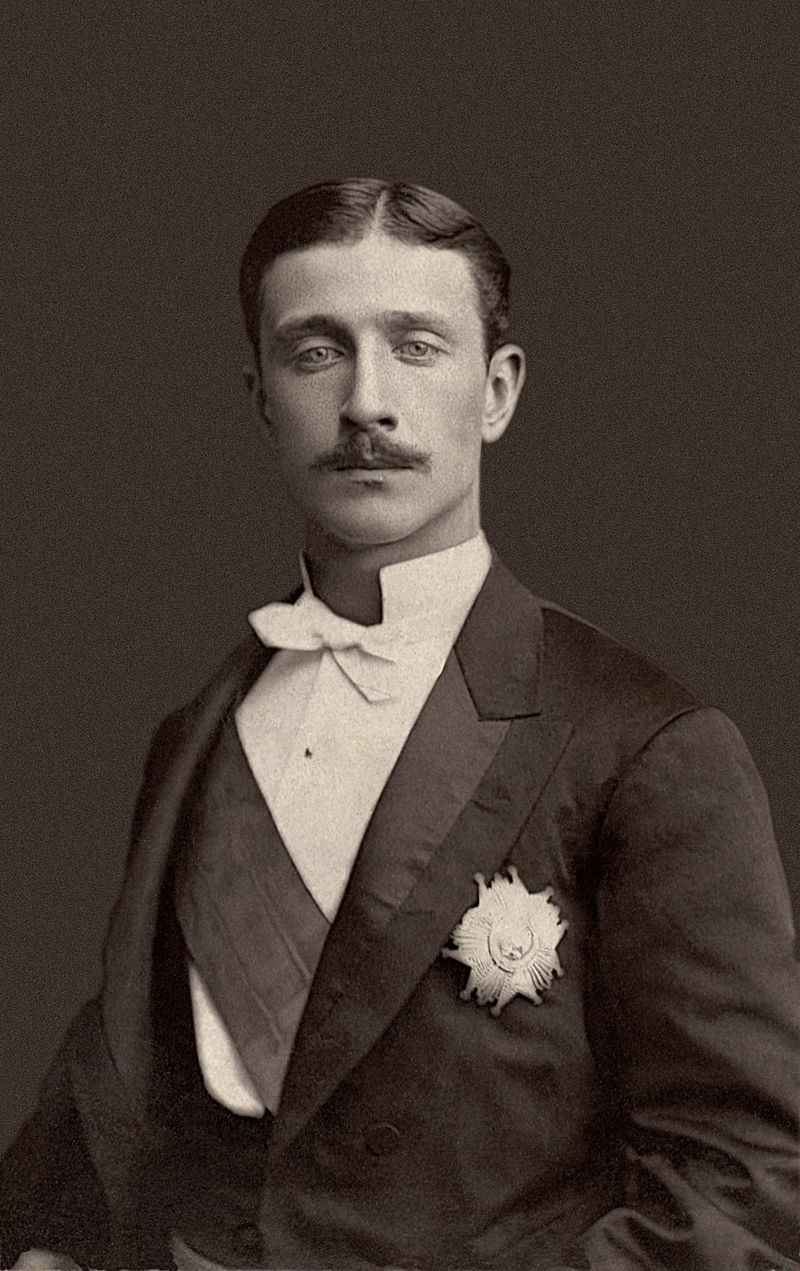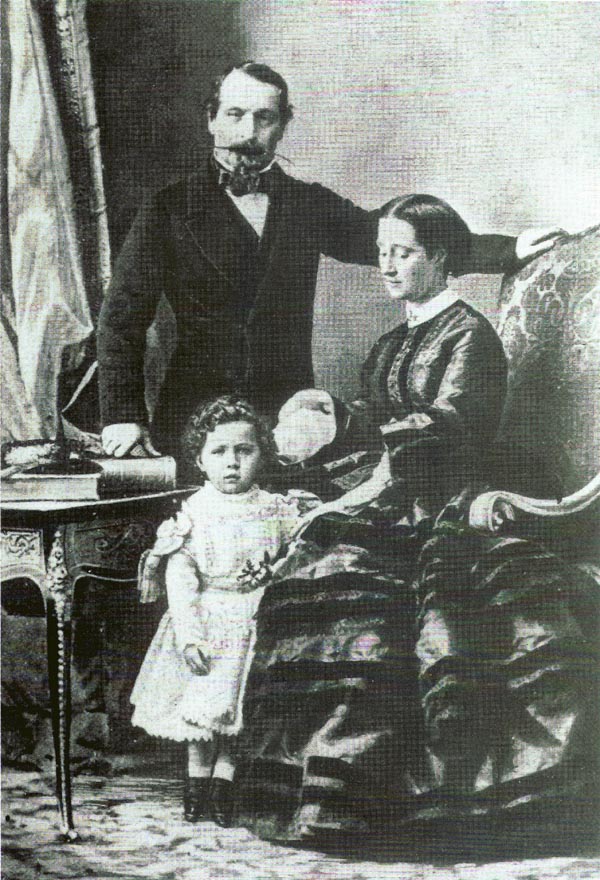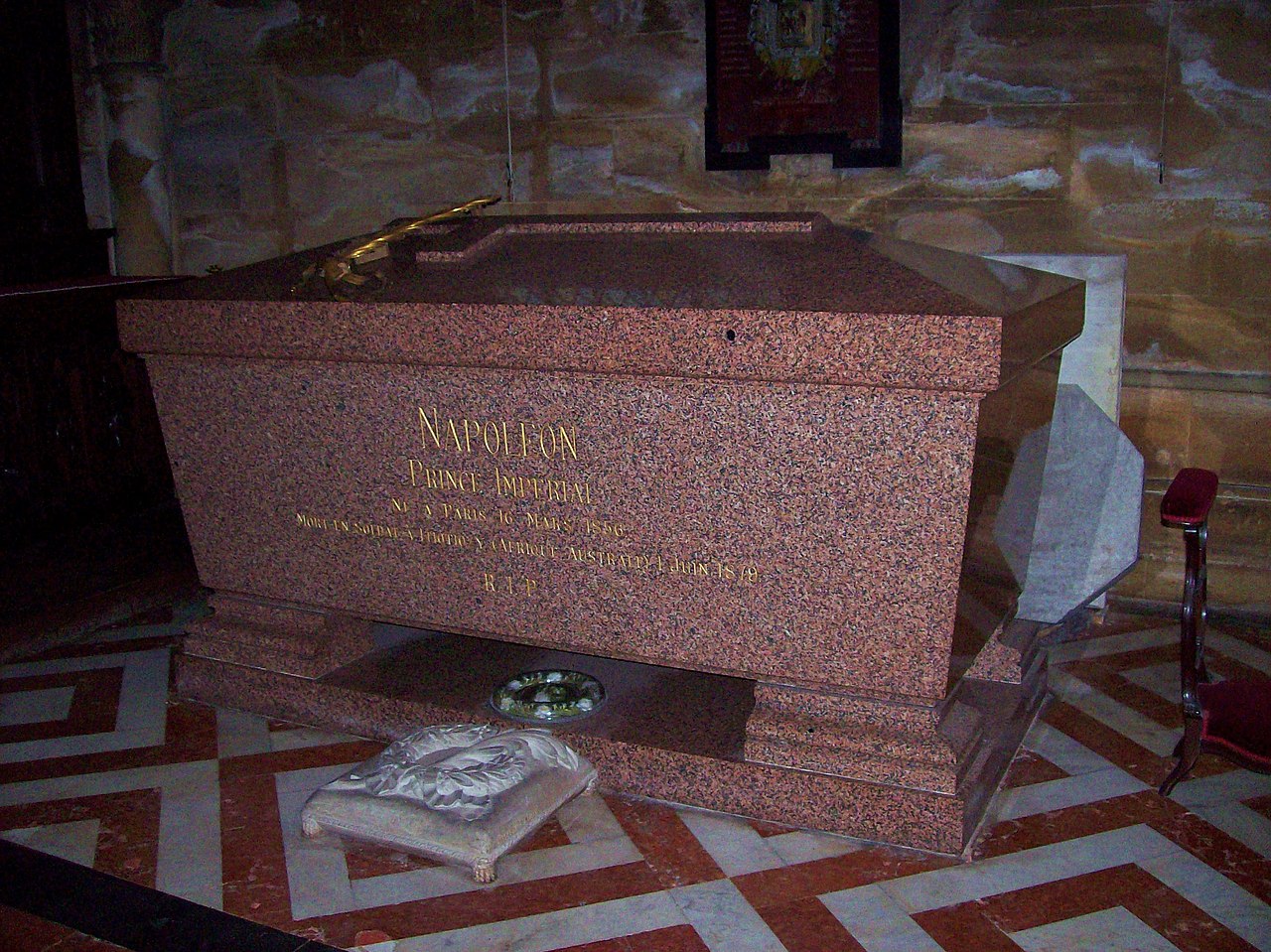by Susan Flantzer © Unofficial Royalty 2019

Louis Napoleon, Prince Imperial; Credit – Wikipedia
Born in Paris, France on March 16, 1856, Napoleon Eugène Louis Jean Joseph Bonaparte was the only child of Napoleon III, Emperor of the French and Eugénie de Montijo. Heir to the throne of the French Empire, from birth he was styled His Imperial Highness The Prince Imperial of France. His parents called him Louis. Louis’s father was born Charles-Louis Napoleon Bonaparte (known as Prince Louis-Napoleon of France), the son of Louis Bonaparte, King of Holland (younger brother of Emperor Napoleon I) and Hortense de Beauharnais (daughter of Emperor Napoleon I’s first wife Joséphine de Beauharnais from her first marriage). Louis’ mother came from the Spanish nobility.

Napoleon III and Eugenie with their son Louis; Credit – Wikipedia
Eight years before the birth of Louis, the French Revolution of 1848 had led to the abdication of Louis-Philippe, King of the French and the Second Republic. Louis’ father Louis-Napoleon was elected to the French National Assembly and the country prepared to elect the first President of the French Republic. Louis-Napoleon immediately threw his hat into the ring, and on December 20, 1848, was declared the winner of the election. Taking the title Prince-President, Louis-Napoleon took up residence at the Élysée Palace in Paris.
After a failed attempt to change the law which would have required him to step down at the end of his four-year term, Louis-Napoleon soon saw a chance to take power by force. Quickly overpowering his opponents, Louis-Napoleon established himself as the sole ruler within France, supported by a referendum held in December 1851. Not content with being simply a Prince-President, Louis-Napoleon arranged for the Senate to schedule another referendum to decide if he should be declared Emperor. On December 2, 1852, following an overwhelming vote in his favor, the Second Republic ended and the Second French Empire was declared. Louis-Napoleon took the throne as Napoleon III, Emperor of the French. He would be the last monarch of France.
Louis was first under the supervision of Miss Shaw, his English nurse who was recommended by Queen Victoria and taught him English from an early age. In 1867, a household was set up for Louis supervised by General Auguste Frossard as his governor, with Augustin Filon as his tutor and Xavier Uhlmann as his valet. However, Louis’ life drastically changed in 1870.

Louis in 1870; Credit – Wikipedia
In July 1870, France entered the Franco-Prussian War. Without significant allied support and with unprepared and limited forces, the French army was quickly defeated. Napoleon III was captured at the Battle of Sedan and quickly surrendered. The Third Republic was declared on September 4, 1870, ending – for the last time – the French monarchy. Napoleon III was held by the Prussians and was not released until March 1871 when peace was established between France and the new German Empire. Napoleon III, his wife, and son went into exile, arriving in England on March 20, 1871, and settling at Camden Place, a large country house in Chislehurst, Kent, England. Napoleon III died at Camden Place on January 9, 1873, at the age of 64. His son Louis was proclaimed Napoleon IV by the Bonapartists.

Camden Place, Louis’ family home in England; Credit – By Ian Capper, CC BY-SA 2.0, https://commons.wikimedia.org/w/index.php?curid=37658334
After the death of his father, Louis and his mother remained in England. Louis attended the Royal Military Academy at Woolwich and finished seventh in his class of thirty-four and was first in riding and fencing. However, he wanted to become an expert in artillery, the weaponry in which his great-uncle Napoleon Bonaparte began his military career and so he transferred to the Royal Horse Artillery at the Aldershot Garrison and attained the rank of Lieutenant in the British Army. Many Bonapartist supporters wanted Louis to leave the British Army and devote himself to his duties as the official Bonapartist pretender to the French throne but he preferred a military career. There were plans for Louis to marry a daughter of King Christian IX of Denmark and Empress Eugénie and Queen Victoria had their own plans to marry him to Princess Beatrice, Queen Victoria’s youngest daughter, but all the marriage plans came to naught.
In 1879, the Anglo-Zulu War started in Africa, and Louis wanted to take part. He was only allowed to do so after his mother approved and Queen Victoria intervened to get him a place in the British Army. Louis was to serve in reconnaissance and the British commanders were repeatedly told not to let him get into dangerous situations and provide him with a sufficiently large escort.

Louis in Africa in 1879; Credit – Wikipedia
On June 1, 1879, Louis participated in a reconnaissance mission. The nine-member patrol was on horseback and stopped at the edge of a river that was thought to be safe but they were surprised by forty Zulu warriors. Louis had not totally mounted his horse at the time of the attack and his frightened horse started to run off with Louis clinging to the saddle. Eventually, the saddle strap broke, Louis fell beneath his horse and his right arm was trampled. He jumped up and with his revolver in his left hand, started to run but the Zulus could run faster. The Zulus overtook him and mortally stabbed him eighteen times with their assegais, a pole weapon made of wood with an iron tip. Louis was just twenty-three years old.
Louis’s death caused an international sensation. In France, there were rumors that the British had intentionally disposed of Louis. Other rumors accused the French republicans and the Freemasons. One account even accused Queen Victoria of arranging the whole thing. Louis’ body was brought back to Royal Arsenal Woolwich on the banks of the River Thames in London. There he lay in state overnight in the riverfront guardhouse. The next day, the funeral procession, which included Queen Victoria, brought Louis’ remains to Chislehurst, his home in England, where he was buried at St. Mary’s Roman Catholic Church next to his father. Empress Eugénie decided to build a monastery and a chapel for the remains of Napoleon III and their son. In 1888, their remains were moved to the Imperial Crypt at St. Michael’s Abbey in Farnborough, Hampshire, England. When Eugénie died in 1920 at the age of 94, she was buried with her husband and son.

Tomb of Louis Napoleon, Prince Imperial; Credit – Wikipedia
This article is the intellectual property of Unofficial Royalty and is NOT TO BE COPIED, EDITED, OR POSTED IN ANY FORM ON ANOTHER WEBSITE under any circumstances. It is permissible to use a link that directs to Unofficial Royalty.
Works Cited
- De.wikipedia.org. (2018). Napoléon Eugène Louis Bonaparte. [online] Available at: https://de.wikipedia.org/wiki/Napol%C3%A9on_Eug%C3%A8ne_Louis_Bonaparte [Accessed 5 Nov. 2018].
- En.wikipedia.org. (2018). Napoléon, Prince Imperial. [online] Available at: https://en.wikipedia.org/wiki/Napol%C3%A9on,_Prince_Imperial [Accessed 5 Nov. 2018].
- Fr.wikipedia.org. (2018). Louis-Napoléon Bonaparte (1856-1879). [online] Available at: https://fr.wikipedia.org/wiki/Louis-Napol%C3%A9on_Bonaparte_(1856-1879) [Accessed 5 Nov. 2018].
- Mehl, S. (2016). Eugénie de Montijo, Empress of the French. [online] Unofficial Royalty. Available at: https://www.unofficialroyalty.com/eugenie-de-montijo-empress-of-the-french/ [Accessed 5 Nov. 2018].
- Mehl, S. (2016). Louis-Napoléon Bonaparte, Emperor Napoleon III of the French. [online] Unofficial Royalty. Available at: https://www.unofficialroyalty.com/louis-napoleon-bonaparte-emperor-napoleon-iii-of-the-french/ [Accessed 5 Nov. 2018].
